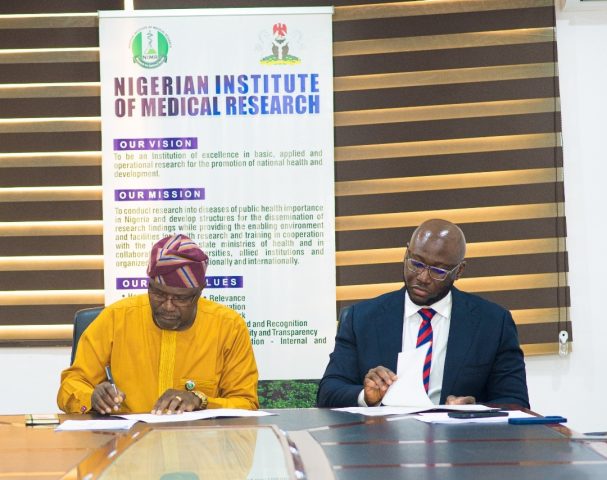Syndicate Bio Signs Memorandum of Understanding with NIMR on Innovative Genomic Studies

By Ngozi Onyeakusi—Syndicate Bio, a platform biotech driving genomics and precision medicine initiatives across the world’s most genetically diverse regions, announced today the signing of a pivotal Memorandum of Understanding [MoU] with Nigeria’s leading governmental research institution, the Nigerian Institute of Medical Research [NIMR]. This landmark partnership sets the stage for transformative genomic studies in infectious and non-infectious diseases, aiming to deepen understanding of the diseases prevalent in Nigeria, Africa’s most populous nation while identifying targets for drug discovery.
Launched in 2023 by Founder Dr Abasi Ene-Obong, alongside co-founders Dr Jumi Popoola and Estelle Dogbo, Syndicate Bio is rapidly establishing itself as a critical player in the field of genomics research. Following its recent launch, the company aims to forge large-scale partnerships with governments, pharmaceutical giants, research and academic institutions and other stakeholders. Using genomic technologies, these partnerships will drive change in the local healthcare landscape through precision medicine while simultaneously generating invaluable datasets crucial for advancing drug discovery and development efforts. In line with its commitment to advancing healthcare through innovation, Syndicate Bio will leverage NIMR’s infectious and non-infectious disease capabilities, which include state-of-the-art laboratories and patient clinics, both at NIMR’s premises and across their partner networks.
This collaboration marks a rarity in Africa, where a private and a government-run public institution collaborates intensely for drug discovery. NIMR, established by an Act of Parliament in 1977, has spearheaded many studies as well as secured different levels of local and international grants, firmly establishing itself as a bedrock of medical research in Nigeria. NIMR’s pivotal role extends to developing viable structures for disseminating research findings and providing an enabling environment for health research and training in cooperation with federal and state ministries, universities, as well as national and international partners, such as Syndicate Bio.
In a significant move that endorses ethical and national interest, NIMR will provide robust ethical oversight through its internal ethics body and the National Health Research Ethics Committee [NHREC] in managing the data and samples generated by the research projects.
Speaking on the collaboration, Dr Abasi Ene-Obong, Founder and CEO of Syndicate Bio, said, “After several months operating in stealth mode, today marks a pivotal moment for Syndicate Bio. Our signed MoU with the Nigerian Institute of Medical Research enables us to shift from stealth to actionable impact, empowering inclusive advancements in African genomics. This partnership not only validates Syndicate Bio’s strategy of forming ethical and transformative alliances but also lays the groundwork for a future where precision medicine is accessible to everyone, everywhere.”
Professor Babatunde Lawal Salako, Director General and CEO of the Nigerian Institute of Medical Research, added: “The NIMR’s partnership with the newly launched Syndicate Bio is a testament to what can be achieved when public research institutions and private innovation collaborate. NIMR hopes to bring its rich, robust experience in genomics and infrastructure to bear on the successful implementation of this much-needed collaborative effort. Together, we will harness the genetic diversity prevalent in Nigeria, and translate them into pioneering healthcare solutions tailored for both the local populace and the global community.”
Seeking to go beyond groundbreaking research, Syndicate Bio and NIMR are actively taking steps to bolster Africa’s scientific future. With this partnership, both organizations will launch targeted capacity-building initiatives focused on nurturing emerging scientists in Nigeria in order to equip them with advanced skills in genomics and molecular science. In doing so, the partnership is priming the next generation of scientists for success in a globally competitive field.
Dr Ene-Obong concludes, “Our strategic alliance with NIMR not only sets a new bar for public-private collaboration in drug discovery, it also serves as an urgent summons to invest in Nigeria’s next generation of scientists. Together with NIMR, we will establish a training program for young scientists in Nigeria, aimed at providing theoretical and practical knowledge of molecular biology, genetics and genomic techniques, thereby equipping them to drive Africa’s scientific narrative.”






Leave a Reply